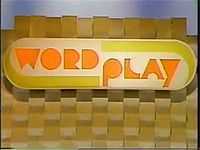Wordplay (game show)
| Wordplay | |
|---|---|
|
Wordplay logo | |
| Genre | Game show |
| Presented by | Tom Kennedy |
| Narrated by | Charlie O'Donnell |
| Production | |
| Location(s) |
NBC Studios Burbank, California |
| Running time | 22–24 minutes |
| Production company(s) |
Fiedler-Berlin Productions Rick Ambrose Productions Scotti Bros.-Syd Vinnedge Television |
| Broadcast | |
| Original channel | NBC |
| Original run | December 29, 1986 – September 4, 1987 |
Wordplay is an American game show which ran on NBC from December 29, 1986 to September 4, 1987. It was hosted by Tom Kennedy, with Jamie Farr substituting for Kennedy for one week of shows, and announced by Charlie O'Donnell. The show was produced by Scotti Vinnedge Television in association with Fiedler/Berlin Productions and Rick Ambrose Television.[1]
The show is notable for replacing the long-running soap opera Search for Tomorrow on the NBC schedule.[2]
Main game
Two contestants, one usually a returning champion, competed in a three-round game where the object was to guess the definitions of any of nine random words displayed on a screen, arranged in a three-by-three grid with the middle row of the grid raised one level above the others. The contestant in control chose a word and three celebrity panelists gave a definition with an accompanying humorous anecdote. The definitions were furnished to the celebrities before the show to aid them.[3]
The contestant had to determine which one of the three definitions was correct, and doing so won the amount of money that was concealed behind the word. If that contestant answered incorrectly, his/her opponent chose between the remaining two definitions. If the correct definition was not found by either contestant, a block was placed on the word and no money could be won from it. Two words were played per round, and for the first two rounds contestants took turns as to who would go first. The trailing contestant was given that opportunity in round three. In the first round, words paid off at either $25, $50, or $75. These amounts doubled in round two and doubled again in round three.
Every word was connected to at least one other word on the board either horizontally or vertically and if a word was connected to one that was played and correctly defined, the values of those words were combined. For instance, if a word was worth $50 and was connected to an already defined word worth $75, the contestant's total score for the correct selection was $125.
As the game progressed, connections to previously defined words became crucial as a contestant could win more and more money. For instance, if a contestant chose a word connected to either of the two words in the first example, the $125 was be added to whatever the word's value was if correctly guessed, and if the two contestants continued to correctly define words and maintain the connections with the already played words, the total winnings from the words continued to increase.
One word per game was designated as a bonus word. Choosing this word and guessing its definition correctly awarded a bonus prize to the contestant, which was his/hers to keep regardless of the game's outcome.
If there was a tie after three rounds, a seventh word was played. The champion (or contestant to the left if there were two new contestants) chose the word and the celebrities provided a brief definition without an accompanying story. The champion was then given the option to guess or pass to the challenger and force that contestant to guess. A correct guess won the game, while guessing incorrectly resulted in an automatic loss.
Double Definitions
The day's champion played a bonus round called Double Definitions for a chance to win an accumulating cash jackpot.
In Double Definitions, the champion faced a twenty-four square, six-by-four grid where all the squares were connected to at least one other square either horizontally or vertically. Each of the squares hid two possible definitions for a word, such as "Writing Implement/Animal Enclosure" for the word "pen". The champion was given 45 seconds to make a path from the left side of the board to the right side of the board. There was no penalty for an incorrect guess on any Double Definition but if the champion passed a block was put up on the board and he/she had to work around it to complete the path.
Each correct word earned $100 for the champion. If the path was completed within 45 seconds, the champion won the cash jackpot which started at $5,000 and increased by $2,500 every day it went unclaimed. The largest pot ever won was $27,500, won during the show's final week on the air.[4]
Contestants were allowed to stay for three consecutive days or until they were defeated, whichever came first.
References
- ↑ "Wordplay". (in English). 1987. Event occurs at Production slate occurs at 21:50. NBC. Missing or empty
|title=(help) - ↑ TV Guide Guide to TV. Barnes and Noble. 2004. p. 707. ISBN 0-7607-5634-1.
- ↑ Disclaimer present in the closing credits of every single Wordplay episode, beginning with the premiere on December 29, 1986; "Celebrities were furnished definitions in advance".
- ↑ Wordplay episode 178, aired September 2, 1987.
External links
- Wordplay at the Internet Movie Database
- Wordplay at TV.com
